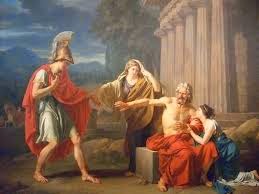 |
| Qedipus at Colonnus |
There are no new stories.
Of course, this is bullshit. Exciting new stories are created and told every day. The glut of derivative and unoriginal books, film and music comes not from unimaginative artists but from cautious and/or savvy business people who market those things that are safe, unoffensive, familiar. It is easy to despair of the current state of music, for example, by listening to top 40 radio which is filled with adolescent pabulum. (I know this is a generational issue - popular music has always been made by young people for young people - but still, Katy Perry and Taylor Swift will not one day be considered original or influential.) But if you look, or listen rather, just beyond the threshold of the mainstream, you will find music that is actually good, that is authentic and original. The same goes for movies and novels.
It has become a something of a platitude to say that there are only a limited number of stories that can be told. Joseph Campbell famously wrote about the monomyth, the hero's journey, the basic structure of almost all traditional stories. Under Campbell's influence, Christopher Booker wrote in 2004 that there are seven basic plots: overcoming the monster, rags to riches, the quest, voyage and return, tragedy, comedy, and rebirth. This idea has taken root and is oft repeated to say that originality is either impossible or that it is not that important. The consequence of this line of thinking, as critics of Booker have pointed out, is that it sets up a criteria for art wherein those works that adhere closely to the archetype are praised and those that deviate are seen as flawed. Crocodile Dundee and E.T. are praised over the works of Kafka and Joyce.
It may be true that the stories we tell are based on a limited number of archetypes, but that does not preclude originality, which is not about telling a story that is absolutely new or creating something out of nothing. Aside from being impossible, such a thing would be alien and incomprehensible. Everything comes from something else. Having sources, influences, and precursors does not make a story unoriginal. Originality is about drawing from various and often disparate influences and combining them in new and interesting ways. As American novelist Edith Wharton said, "True originality consists not in a new manner but in a new vision."
This is the tricky part. In his introduction to Mervyn Peake's Gormenghast series, fantasy books widely regarded as being very original, Quentin Crisp says that being original is not about looking left and right at your neighbor's garden paths, seeing that one is perpendicular and the other parallel, then making your own diagonal. It is not about taking something you like and just putting a superficial spin on it. You don't take inspiration from Hellboy and decide you will make Heavengirl, or take Lord of the Rings and make Master of the Squares. It is about creating something that is truly your own.
Author Stephen James said "Originality does not consist in saying what no one has said before but in saying exactly what you think yourself." This is important. Originality in art is more about authenticity, your unique voice. The original work of art does not have to be something radically different but it must offer a unique perspective.
 |
| Alice in Wonderland |
It is okay to imitate authors you like, but eventually you must find your own voice, your own ideas, your own combination of the elements that constitute the craft. Imitations are essentially inauthentic. For me, originality is perhaps the most important quality of any work, but especially in SF/F, where the whole point is to imagine different worlds and different people.

